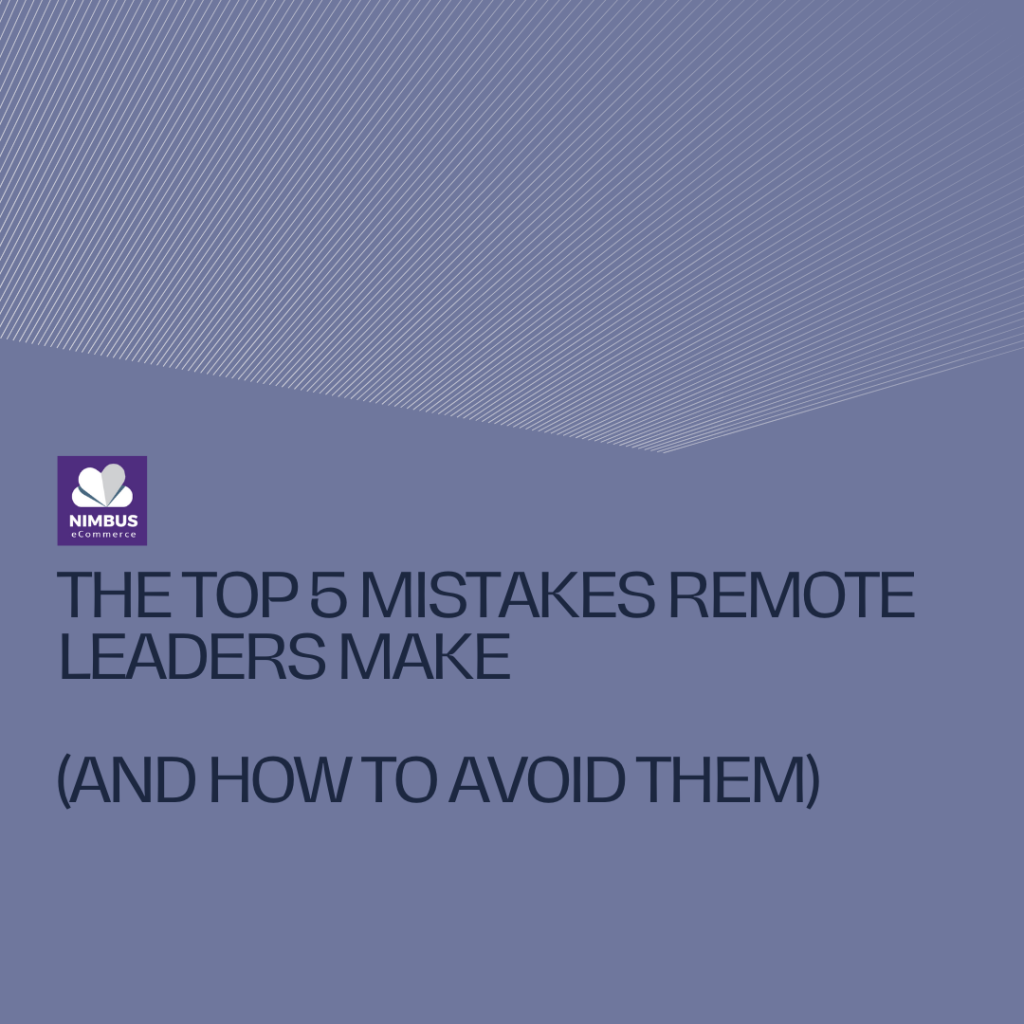The Top 5 Mistakes Remote Leaders Make (And How to Avoid Them)
Do you lead a remote team? If so, you know that there are unique challenges and opportunities associated with leading people who are not located in the same physical space.
Here at Nimbus eCommerce all our team members work remotely. We made this decision back in year 2020 during the first lockdown and so far it is working very well. But it wasn’t that easy from the start.
With remote work becoming increasingly normal, especially when it comes to businesses trading online, it\’s important to be aware of the top mistakes that remote leaders make so that you can avoid them and protect your team\’s productivity and morale.
Leading from behind a screen certainly isn\’t the easiest thing in the world, so in this post I will try to share my experience with leading a remote team. Let\’s take a closer look at the biggest mistakes remote leaders make, and how you can avoid them.
#1 – Not Setting Clear Expectations
One of the most common mistakes remote leaders make is failing to set clear expectations. If your team members don’t know what is expected of them, they will likely become frustrated and disengaged. To avoid this, be sure to set clear expectations for every member of your team from the outset. This means being clear about deadlines, deliverables, and exactly what you need from each team member in terms of their work.
In our team here at Nimbus, everyone has his responsibilities clearly assigned to them. Each accountant has their own client base to manage. The deadlines are clearly defined and incorporated into our calendars.
#2 – Micromanaging
Not setting clear expectations can also lead to another common mistake that remote leaders make: micromanaging. If you are not clear about what you expect from your team members, you may find yourself wanting to micromanage their work in order to ensure that it meets your standards.
Similarly, if you are new to remote leadership, you may feel less in control than you would in an office environment and find yourself wanting to check in with your team every five seconds, or becoming alarmed if they take more than a few minutes to respond to your messages.
I had a very strong tendency to micromanaging at the beginning. Being a perfectionist, I thought no one could do things better than myself. I quickly realised that this was not working out. It was frustrating for Nimbus team members and ultimately lead to them feeling disengaged and unproductive.
To avoid micromanaging, I set clear expectations up front, gave my team members the space to do their work and provided regular feedback to keep them on track.
Share:
More Posts
Send Us A Message
#3 – Not Checking In Enough
Of course, on the opposite end of the spectrum, some remote leaders only check in once in a blue moon which can be harmful for team morale.
Often, team members who are struggling may not have the confidence to reach out which is why it\’s so important for leaders to proactively check in.
Checking in doesn\’t have to be a time-consuming process. A simple message checking in on a team member\’s progress can go a long way.
The key is to strike the right balance – checking in too much can be stifling, but checking in too little can make team members feel unimportant.
I reach out regularly to my team to find out if there’s anything I can do to make them feel supported. I run weekly 1-2-1 meetings with each of Nimbus team members and go through any issues they may have. We also have a team catch up every week. This is a great way to stay connected with my team and ensure that everyone is communicating well.
#4 – Not Using Project Management Software
In the age of remote working, project management software is the best way for teams to communicate, coordinate and stay on top of deadlines.
Not using project management software can make it difficult to keep track of deadlines, assigned tasks, and progress reports. This can lead to projects falling behind schedule and team members feeling overwhelmed.
There are a number of great project management software options available, so there\’s no excuse for not using one.
A few popular options include Asana, Trello, and Basecamp. Here at Nimbus we use Xero Practice Management, which is more specific for the accounting profession. Karbon and Senta are great choices as well.
#5 – Not Intentionally Creating a Company Culture
Just because your company is remote doesn\’t mean that you don\’t need a great company culture.
In fact, company culture is even more important for remote teams because it can help to create a sense of community and connection.
There are a number of ways to intentionally create a great company culture for your remote team.
Here at Nimbus we hold regular social events, like virtual happy hours or coffee chats. You can also encourage team members to connect with each other outside of work by starting a remote community.
This keeps our team happy and makes them feel like a valued part of a community, rather than a lone remote worker.
Summary
If you want to be a successful remote leader, avoid making these five common mistakes. By setting clear expectations, striking the right balance between checking in and giving team members space, using project management software, and intentionally creating a positive company culture, you\’ll be well on your way to leading a successful remote team.
Learn from our experience!
Have a look to find out more…


